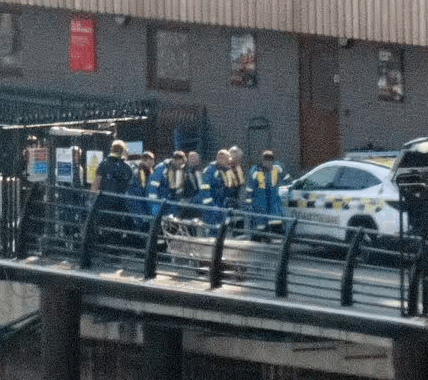Dan Swords hailed the decision as “a huge victory for Harlow – and for every resident who stood with us to fight this wrong and reckless plan”.

Endeavour House is in the centre of Harlow (Image: Google Maps)
Controversial plans to begin using a converted office in the centre of Harlow to house asylum seekers have been scrapped, the leader of the Essex town’s council has claimed. However, the Home Office has insisted it has not been directly involved and will not be taking over the building.
Dan Swords, the Tory leader of Harlow District Council, on Monday voiced his outrage at what he claimed was the Labour Government’s plans for Endeavour House. However, in a press release issued on Tuesday, he said: “This afternoon, I can confirm that we have managed to stop the Government’s proposal to use Redstone House to house asylum seekers. We have just received confirmation that this will not go ahead
“This is a huge victory for Harlow – and for every resident who stood with us to fight this wrong and reckless plan. From the moment this proposal was announced, I said clearly: we would do everything in our power to stop it – and we did.
“They have now listened. They have backed down. And we have won.
“And do not for a moment think that this was easy. We have worked around the clock to tackle this head-on and to protect our town.
“The proposal was clear that they were seeking 204 beds for this site – not 3 as some are suggesting.
“This was never just about one building – it was about standing up for our Harlow.

Home Secretary Shabana Mahmood (Image: Getty)
“About keeping our residents safe. About protecting the future of our town centre. About ensuring that Harlow homes are for Harlow people.”
Formerly known as Redstone House, the building, located opposite the library, was evacuated in May due to severe safety concerns, displacing 20 families who had been relocated from London boroughs.
It reopened in September under its new name, with rents for a two-bedroom flat advertised at £1,575 per month—a hefty increase of more than £500 compared with previous levels.
Cllr Swords had condemned the move as “reckless, irresponsible, and a betrayal,” accusing the Home Office of treating the town like a “dumping ground” for failed immigration policies.
He emphasised the block’s recent instability and warned that repurposing it could trigger “serious and destabilising unrest,” undermining hundreds of millions invested in regenerating the area with new homes, shops, and public spaces.
He emphasised: “We believe in Harlow homes for Harlow people,” vowing to fight the plan politically, legally, and publicly, including writing to Home Secretary Shabana Mahmood to demand an urgent meeting.
A Home Office spokesperson said: “This is untrue – we will not be taking over this site.”
The council’s provider, Dunlap Property Solutions, did consult with Harlow Council about the use of one flat within the building last week, but the authority was yet to respond, the Home Office has stressed.The block is now owned by Beyond Infrastructures Limited, according to the Land Registry.
The controversy highlighted broader tensions in commuter towns such as Harlow, a post-war new town. Endeavour House, situated in Harlow’s town centre, was constructed around 1990 as commercial office space, not initially as a residential development.
It later underwent permitted development conversion into apartments, accommodating tenants mainly relocated from London boroughs. However, persistent safety issues prompted its evacuation in May 2025 and temporary closure, prior to reopening in September under its rebranded name amid ongoing regeneration efforts.
This pattern of repurposing commercial spaces is part of a trend. A pivotal shift came in May 2013 when government ministers introduced permitted development rights (PDR), permitting office blocks to be converted into residential flats without full planning permission.
By March 2019, Harlow Council had documented 13 conversions yielding over 1,000 small units, many in industrial zones with poor access to transport, schools, healthcare, and shops, amid traffic and pollution risks.
Croydon-based Caridon Property Group managed around 40% of these, including Terminus House—opened in April 2018 atop a multistorey car park—and Templefields House, with flats as small as 18 square metres, below the 37-square-metre minimum for a one-bedroom.
Then-Tory MP Robert Halfon called the influx a “disaster,” accusing London boroughs of “socially cleansing” their areas by relocating hundreds of “troubled families” to cut costs, inverting Harlow’s founding role.
A 2018 Harlow Council report citing increased police calls for suspected drug dealing, domestic abuse and antisocial behaviour, with families left “isolated and unsupported.”
